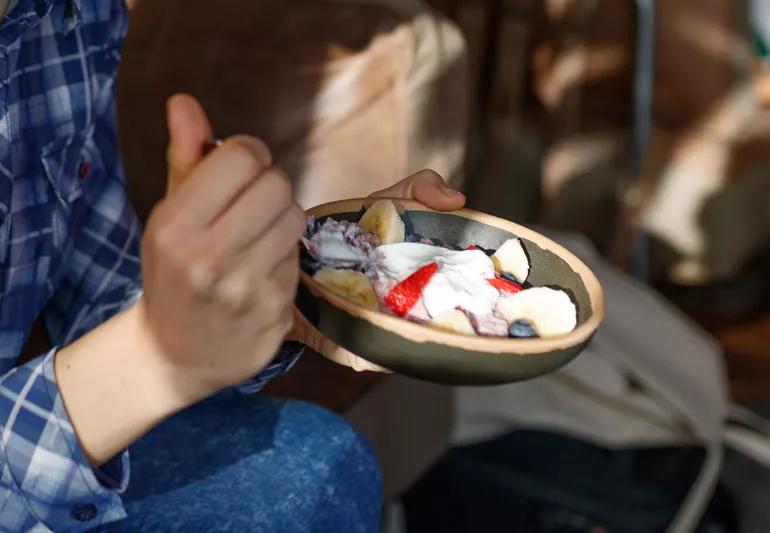Locations
:
Search
Advertisem*nt
December 3, 2019//Nutrition
A low-FODMAP diet may control symptoms
If you have irritable bowel syndrome (IBS), knowing what to eat can feel like the holy grail. For some patients, the right diet, along with attention to exercise, can control symptoms without medication.
Advertisem*nt
Cleveland Clinic is a non-profit academic medical center. Advertising on our site helps support our mission. We do not endorse non-Cleveland Clinic products or services. Policy
Dietitian and researcher Gail Cresci, PhD, RD, says she often recommends a special diet of easily digestible food, called a low-FODMAP diet, which you’ll find outlined below.
FODMAP stands for “fermentable oligo-, di-, and monosaccharides and polyols” – a mouthful to say, but in more common terms, FODMAPs are carbohydrates that may not be digested or absorbed well, Dr. Cresci explains. Undigested carbohydrates are then metabolized by intestinal bacterial to produce excess gas, which leads to abdominal pain, diarrhea and/or constipation.
What foods to limit (and good substitutes)
Here’s a breakdown of what foods tolimit when you’re following a low-FODMAP diet, as well as some suggested substitutes:
- Lactose is found in milk and other soft dairy products like cottage cheese, cream cheese, ice cream and sour cream. Anyone can handle a very small amount of lactose, but if you eat more than your intestine can handle, you will get gas and abdominal pain. About half the population is born with low levels of lactase, which metabolizes dietary lactose.
What to eat instead: Try lactose-free milk, oat milk, rice milk or soy milk as good alternatives to cow’s milk, as well as lactose-free yogurt. For cheese, try any of these three: hard cheeses, brie and camembert. Need butter? Go for olive oil instead.
- Fruits contain the sugar fructose, which can cause issues for IBS sufferers. Fructose is particularly high in apples and pears, and somewhat high in watermelon, stone fruits, concentrated fruit, dried fruit and fruit juice. Fruits with lower levels of fructose include bananas, citrus, grapes and berries.
What to eat instead: Eat fruits that are lower in fructose, such as banana, blueberry, boysenberry, cantaloupe, cranberry, grape, orange, lemon, lime, kiwi and strawberry.
- Certain vegetables cause gas and abnormal bowel habits.Avoid cruciferous vegetables such as broccoli, cauliflower, cabbage, coleslaw and sauerkraut. Also, limit artichoke, brussels sprouts, onions, shallots, leeks and asparagus.
What to eat instead: Vegetables that are good to eat include eggplant, green beans, celery, carrots, spinach, sweet potato, yam, zucchini and squash. You can enhance flavors of these veggies with herbs. On the safe list, you’ll find: basil, chili, coriander, ginger, lemongrass, marjoram, mint, oregano, parsley, rosemary and thyme.
- Legumes, or beans, are often called the “musical fruit” because they contain indigestible saccharides. Baked beans, chickpeas, lentils and soybeans have high amounts. So IBS patients should avoid them, or eat them in very small quantities.
What to eat instead: While not exactly a substitute for beans, you can enjoy rice, oats, polenta, millet, quinoa and tapioca. Also, as long as you do not have celiac disease, you can eat gluten on a low-FODMAP diet, which is an inaccuracy of some charts.
- Polyols, sugar substitutes found in sugarless gum and candy, also can cause problems. Avoid them, including sorbitol, mannitol, isomalt, maltitol and xylitol.
What to eat instead: It is perfectly fine to eat (in moderation, of course) good old-fashioned sugars, other artificial sweeteners that do not end in “ol,” (like NutriSweet® and Splenda®) and honey substitutes (maple syrup, molasses and golden syrup).
Advertisem*nt
The best treatment for IBS
Sometimes IBS is treated with medications, but a change in diet is the first thing we try. A healthy lifestyle — with a low-fat diet, exercise and avoidance of alcohol and cigarette smoking — often makes a great difference. For people who still need help, special diets like a low-FODMAP diet can provide relief.
“While the low-FODMAP diet is often difficult for many to follow, it is often worth seeing if it will ease your symptoms,” Dr. Cresci says. Working with a registered dietitian can help you make the best food choices and maintain a balanced diet.
Your doctor may find that medication is also necessary to keep your symptoms at bay.These therapies include anticholinergic medicines, which calm the spasms, and antidepressants to reduce stress.
Advertisem*nt
Learn more about our editorial process.
Advertisem*nt
Related Articles
August 29, 2023/Digestive
8 Signs That Irritable Bowel Syndrome’s Causing Your Digestive Troubles
Symptoms of IBS usually include abdominal pain, coupled with bloating and more
April 23, 2023/Wellness
Benefits and Uses of Xiao Yao San
This traditional Chinese medicine formulation may help with stress, depression and more
March 26, 2023/Digestive
Understanding the Differences Between IBD and IBS
IBD is an inflammatory disorder, while IBS is a group of symptoms, but both need treatment
May 10, 2022/Digestive
How Often and How Long Should It Take You to Poop?
Everyone poops, but here’s what may affect how often you visit the toilet
November 8, 2021/Nutrition
Should You Follow a Low-FODMAP Diet?
Find out which foods could be causing IBS symptoms
January 11, 2021/Digestive
Stomachaches? Avoid These 3 Mistakes if You Suspect IBS
Best advice from a GI expert
October 14, 2020/Digestive
How to Manage Irritable Bowel Syndrome With Your Brain
Behavioral medicine techniques can help ease symptoms
September 24, 2020/Digestive
IBS: 5 Tips to Control Symptoms When You Travel
You don’t have to limit travel with proper planning
Trending Topics
How To Increase Your Metabolism for Weight Loss
Focus on your body’s metabolic set point by eating healthy foods, making exercise a part of your routine and reducing stress
5 Ways Forever Chemicals (PFAS) May Affect Your Health
PFAS chemicals may make life easier — but they aren’t always so easy on the human body
Could Rice Water Be the Secret To Healthier Hair?
While there’s little risk in trying this hair care treatment, there isn’t much science to back up the claims
Ad



